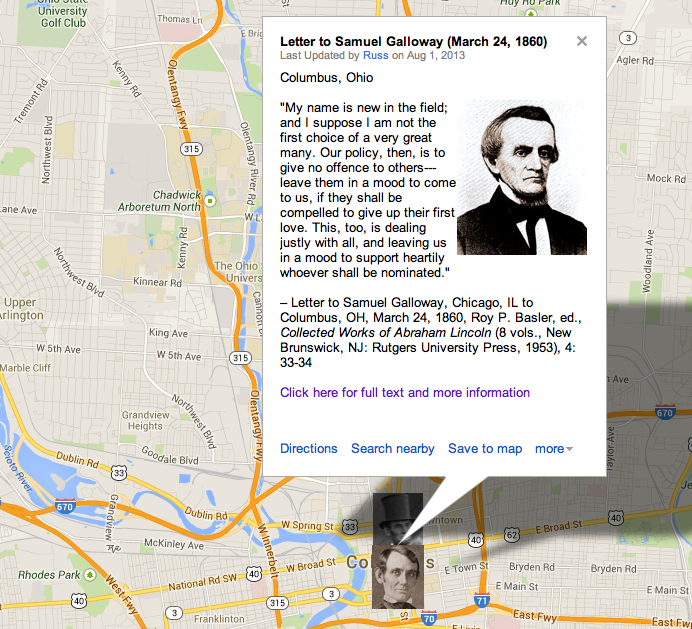Ranking
#141 on the list of 150 Most Teachable Lincoln Documents
Annotated Transcript
On This Date
HD Daily Report, March 24, 1860
The Lincoln Log, March 24, 1860
Custom Map
How Historians Interpret
“From New York, Lincoln continued on to New England for two arduous weeks of speechmaking. He returned home in the middle of March, weary but pleased by the results of his Eastern tour. Now more or less openly a presidential candidate, he explained his strategy to a supporter in Ohio, where another party leader, Salmon P. Chase, was eyeing the nomination.”
— Don Edward Fehrenbacher, Abraham Lincoln: a Documentary Portrait Through his Speeches and Writings (Stanford: Stanford University Press, 1964), 143.
“But it was not absurd, for the race for the nomination was wide open. Seward seemed to be the front runner, but many thought him as unelectable as Chase. Other names being tossed about – John McLean, Nathaniel P. Banks, Edward Bates, Lyman Trumbull, Jacob Collamer, Benjamin F. Wade, Henry Wilson – were all long shots at best. As Schuyler Colfax noted in December 1858, ‘there is no serious talk of any one.’ Despite his modesty, Lincoln between August 1859 and March 1860 positioned himself for a presidential run by giving speeches and corresponding with party leaders in several states, among them Iowa, Ohio, Wisconsin, New York, Connecticut, Rhode Island, New Hampshire, and Kansas. At the same time, he labored to keep Republicans true to their principles by having them steer a middle course between the Scylla of Douglas’s popular sovereignty and the Charybdis of radical abolitionism. Only thus could he and his party capture the White House. And only thus could a lesser-known Moderate like himself lead the ticket.”
–Michael Burlingame, Abraham Lincoln: A Life (2 volumes, originally published by Johns Hopkins University Press, 2008) Unedited Manuscript by Chapter, Lincoln Studies Center, Volume 1, Chapter 14 (PDF), 1524-1525.
NOTE TO READERS
This page is under construction and will be developed further by students in the new “Understanding Lincoln” online course sponsored by the House Divided Project at Dickinson College and the Gilder Lehrman Institute of American History. To find out more about the course and to see some of our videotaped class sessions, including virtual field trips to Ford’s Theatre and Gettysburg, please visit our Livestream page at http://new.livestream.com/gilderlehrman/lincoln

